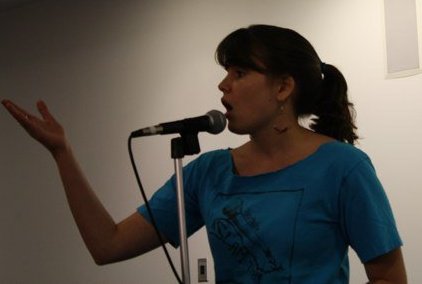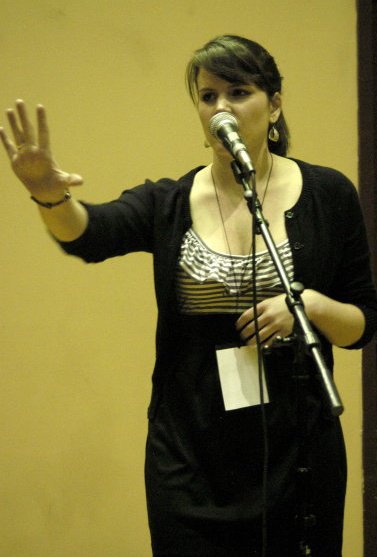

“A poetry slam is somewhere between a baseball game and a crazy party,” said slam poet Grace McDermott, a third-year Public Relations major. “You never know how the audience is going to act.”
Even though she first heard about the spoken-word art form at Temple University, her first college, McDermott didn’t try slam poetry until she transferred to SUNY New Paltz in Fall 2009. Ever since then, slam poetry has provided her with the ability to express herself outside of music.
Slam, which was revitalized in the early ‘90s, is an oral tradition where original works of poetry are read aloud and performed in a dramatic fashion.
Only a few months after first attempting slam poetry, McDermott qualified as an alternate for the SUNY New Paltz Slam Team. This meant she would have the chance to compete at the College Union’s Poetry Slam Invitational, the national competition for slam poetry. In order to earn an official spot on the team, her performance was key.
In February 2010, McDermott performed with the wildcard draft team at the Wade-Lewis Poetry Slam Invitational, hosted at SUNY New Paltz. Slam Team Coach, Brian Omni Dillon said “she absolutely blew everyone away.”
“She was very obviously raw and young and had a good bit to learn,” said Dillon. “But the tools were there for her from jump street.”
In a poetry slam there is a three minute time limit for all poems, and the judges are five randomly chosen audience members. The judges rate the performances of the poets on a scale of one to 10. The rest of the audience is encouraged to react however they feel whether it’s booing or cheering or anything in between.
McDermott said she draws inspiration from people or instances where she’s seen something either really awesome or really terrible. Her favorite poem that she has written is called “Brian’s Song” and is about her cousin who has autism.
“That poem in particular was really important to me because it’s hard for me to understand autism,” said McDermott. “The poem gave me a chance to think about the person rather than the disease.”
McDermott said it can be difficult to write a slam, and there have been several poems that she wants to write but can’t without more experience.
For her, slam poetry is a way to talk about issues that are generally off limits in society.
“When you start talking about something you can’t really talk about, you start to accept it and it becomes part of your life and everyone knows it,” said McDermott.
After spending much of her time as a student practicing her craft, McDermott said she ultimately hopes her poems will help people relate to each other.
McDermott said she strongly encourages everyone to try slam poetry at some point in their lives as a form of expression.
“The best part is it doesn’t have to rhyme or make sense to anyone but yourself,” said McDermott, “It’s just a great way to get an emotional catharsis.”
